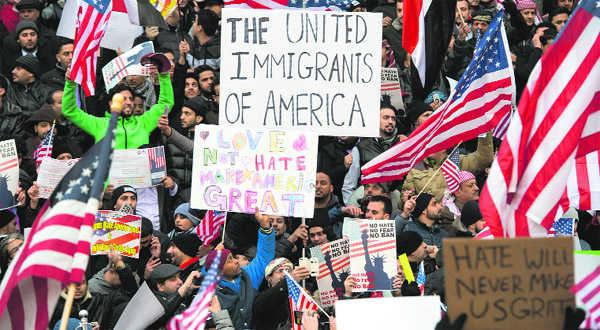A sense of loss
US President Donald Trump’s proposed curbs on H1B visa, as a bigger part of his ‘America First,’ have unnerved the Indian IT sector. As protectionist trade and aggressive diplomacy define the new normal in American scheme of things, The Tribune takes a look at both the fronts
The global fears over Donald Trump’s presidency are beginning to come true. The maverick Republican seems to be a man in a hurry, issuing executive orders at a breathless pace focusing on immigration, terrorism and trade. As the world watches on nervously for his administration’s next move, there are growing concerns in India over imminent visa restrictions.
An air of uncertainty and fear has gripped the Indian IT companies employing around 3 lakh Indians, working in the US on H1-B visa. Typically, they account for over 86% of H-1B visas issued for technology firms. The proposed curbs could not have come at a worse time for the Indian IT sector which is already smarting under downward revision of revenue growth forecasts. Is it the end of the Great American Dream for Indian techies?
“I have waited for onsite assignment for several years. That dream may not come true now. My company may not send me to the US in view of the changed atmosphere,” said Anil Kumar, a software engineer working for a leading IT solutions company in Hyderabad. There are thousands of Indian engineers like him who are more than willing to work for a low salary, if they get to work in America under H-1B. It is seen as a passport to a dream life in the Land of Opportunities.
Indians account for one lakh such visas every year, besides another 1.25 lakh that are renewed. Indian IT companies such as TCS, Infosys, HCL and Wipro have been cornering a major chunk of H-1B visas and send their Indian employees to work in the US on much lower salaries. The imminent protectionist policies of the Trump administration, in the name of ‘America First’ policy, have fuelled fears over Indian students aspiring to pursue post-graduation courses in American universities.
Signs of panic
“I have got admission in Computer Science PG course in a reasonably well-ranked US university. I am in a dilemma now. What happens if I do not get any job after that? What happens if I am denied H-1B visa?” said Praneeth Reddy. He says many of his engineering friends are caught in a similar situation. Hyderabad sends more students to US than New Delhi and Mumbai. During the period 2008-12, over 30,000 students from the city went to the US to pursue higher studies.
The proposed amendment to deny jobs to the spouses of H-1B visa holders has also caused severe consternation. “I plan to join my husband in the US who is an H-1B visa holder. If I am not allowed to work, what will I do there?” asks Anjana Reddy, an electronics engineering graduate from a local college.
The key element of the bill, proposed by Zoe Lofgren, a Democrat Congresswoman from California and representing Silicon Valley, is the minimum salary requirement of $130,000 to be eligible for H-1B visa. “The risks to the IT services sector include an increase in cost per professional, more local hiring and a disruption in service continuity, which may have a negative impact on profitability of companies that are visa-reliant,” said the National Association of Software and Services Companies (Nasscom). Its president R Chandrashekhar questioned the rationale behind the amendments and said, “Raising wage levels for H-1B dependent companies alone will defeat the basic objective as non-dependent companies can continue to bring in skilled workers at lower wage levels, thereby nullifying the objective of protecting job opportunities for American nationals.”
Chandrashekhar says the bill does nothing to address the underlying shortage of skilled workers, which has led all companies to have a calibrated strategy of hiring locally and bridging the skills gap by bringing skilled workers on non-immigrant visas including H-1Bs. It is also argued that over last five years, the Indian IT sector has created over 4.11 lakh direct jobs in the US and contributed around $20 billion in local taxes.
The other view
There are those who contend that the proposed amendments to the much-abused visa programme would actually benefit Indians, and that the social and mainstream media have been spreading fear psychosis based on unverified and inaccurate information. “In a way, these proposed changes may affect the IT companies that send IT graduates from India on cheaper salaries and work out positively for Indian students on US campuses,” said Narsi Reddy Gayam, an alumnus of MIT and an education consultant.
Since Indians constitute the second highest foreign students on US campuses, the proposals may actually appeal to them. “Instead of the present lottery system, the proposed H-1B visa allocation based on market needs is likely to enhance the chances of employment for students passing out from good schools with good academic track records. The present system doesn’t differentiate between students from good institutions or those working in good companies. The salaries will improve and so will chances for meritorious candidates,” Reddy said.
The proposal to make Masters Degree mandatory and to remove numerical quotas per country in the issuance of Green Cards would actually benefit Indians, he argued.
The Infosys founder and one of the pioneers of India’s IT industry NR Narayana Murthy asked the IT companies to take an optimistic view of the changes. “We should look at it more as opportunity for Indian companies to become more multi-cultural than we have been, rather than looking at it as a lacuna,” he said. “Indian software companies must recruit American residents in the US, Canadians in Canada, British people in Britain. That’s the only way, we can become a true multi-national company and in order to do that, we should stop using H1-B visas and sending a large number of Indians to those countries to deliver services,” Murthy says.










